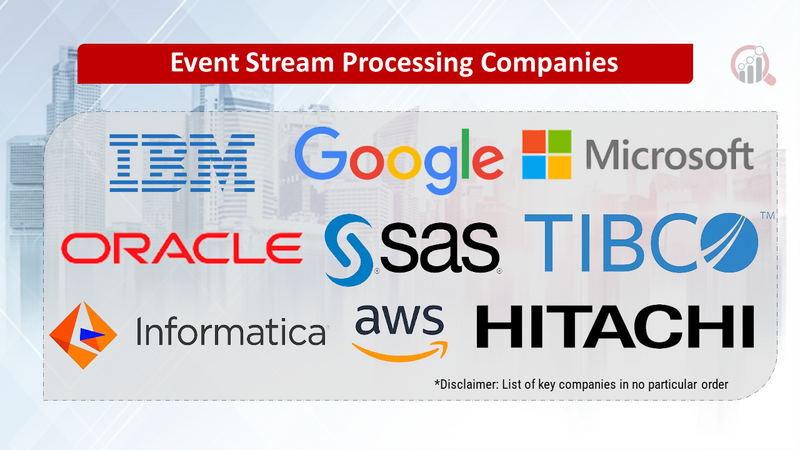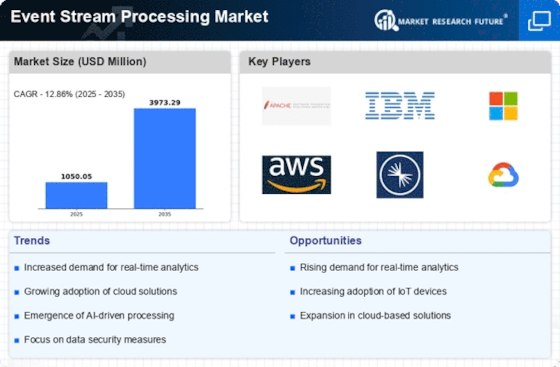Top Industry Leaders in the Event Stream Processing Market

Event Stream Processing Market: Dive into the Latest News and Updates
The event stream processing (ESP) market is surging, propelled by the ever-increasing volume and velocity of data generated by the Internet of Things (IoT), connected devices, and real-time applications. Businesses across various sectors are realizing the immense potential of ESP in unlocking actionable insights from this data deluge, enabling faster decision-making and improved operational efficiency.
Some of Event Stream Processing Companies Listed Below:
- IBM
- Microsoft
- Oracle
- SAS
- AWS
- Confluent
- Dataartisans
- Databricks
- Equalum
- ESPertech
- EVAM
- Fico
- Hitachi Vantara
- Informatica
- Sqlstream
- Streamanalytix
- Streamlio
- Striim
- Tibco
Strategies Driving Market Share Growth:
-
Hybrid and Multi-Cloud Adoption: Companies are embracing hybrid and multi-cloud deployments to cater to diverse infrastructure needs and leverage the best-of-breed offerings from different cloud providers. -
AI and Machine Learning Integration: Integrating AI and machine learning capabilities into ESP platforms enables real-time analytics, anomaly detection, and predictive maintenance, further enhancing the value proposition. -
Edge Computing Integration: Deploying ESP solutions at the edge of the network, closer to data sources, minimizes latency and optimizes real-time data processing for latency-sensitive applications. -
Developer-Friendly Tools and APIs: Providing intuitive tools and APIs simplifies development and deployment, attracting a wider range of users and fostering broader adoption.
Factors Influencing Market Share Analysis:
-
Industry Verticals: Different industries have varying needs and challenges related to real-time data processing. Understanding the specific requirements of verticals like finance, healthcare, manufacturing, and retail is crucial for tailoring solutions and gaining market traction. -
Technology Advancements: Continuous innovation in areas like stream processing engines, distributed databases, and data serialization formats shapes the competitive landscape and influences platform adoption. -
Security and Compliance: Data privacy and security concerns are paramount, especially in regulated industries. Offering robust security features and compliance with relevant regulations is essential for gaining trust and market acceptance. -
Pricing and Licensing Models: Flexible pricing models and subscription options cater to diverse budget constraints and usage patterns, ensuring wider accessibility and market penetration.
Emerging Companies and Innovation Trends:
-
Serverless ESP: Serverless architecture is gaining traction, offering on-demand scalability and reducing operational overhead for businesses. -
Real-time Stream Analytics: Advanced stream analytics tools are enabling real-time visualization, anomaly detection, and predictive insights, empowering businesses to make data-driven decisions in the moment. -
Edge-to-Cloud Continuum: Seamless integration of edge computing and cloud infrastructure facilitates efficient data processing, storage, and analysis, catering to diverse application needs.
Current Investment Trends:
-
Venture Capital Funding: Startups developing innovative ESP solutions are attracting significant venture capital funding, fueling market growth and technological advancements. -
Strategic Partnerships and Acquisitions: Established players are forming partnerships and acquiring promising startups to expand their technology offerings and customer base. -
Open-Source Contributions: Open-source projects like Apache Kafka continue to receive substantial investments and contributions, fostering a collaborative ecosystem and accelerating technology development.
Latest Company Updates:
July 3, 2024:
- Focus on hybrid ESP deployments: Combining cloud and on-premises solutions for optimal flexibility, scalability, and data privacy compliance.
- Challenges in ensuring seamless data integration and maintaining performance across hybrid environments.
July 10, 2024:
- Rise of serverless ESP offerings: Pay-as-you-go model enables cost-effective scalability and simplifies event stream processing infrastructure.
- Concerns about vendor lock-in and limited customization options in serverless ESP platforms.
July 17, 2024:
- Integration with artificial intelligence (AI) and machine learning (ML): Advanced analytics and anomaly detection for real-time insights and predictive actions.
- Challenges in data quality and bias considerations when applying AI/ML to high-velocity event streams.











